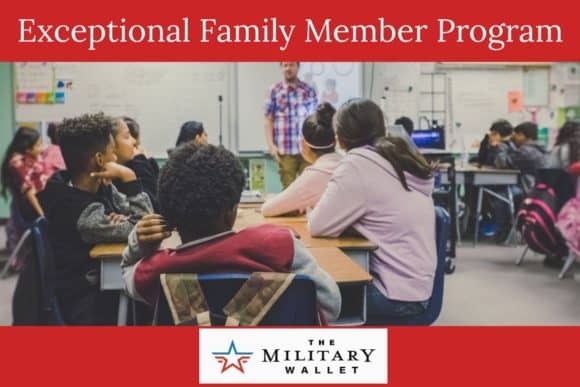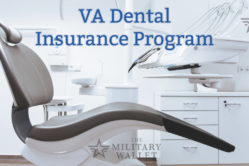Table of Contents
Serving in the military can be complicated. That’s why the Department of Defense offers so many programs to help service members and their families thrive in difficult environments. From health care to off-duty activities to 30 days of leave, the military tries to provide a wide range of services to help military members and their families. This includes families with members who have special needs, including special educational or health care needs.
Two of these programs as the Exceptional Family Member Program (EFMP) and respite care for military-connected primary caregivers. Let’s take a look at these programs.
What is EFMP?
The Exceptional Family Member Program (EFMP) is available to military families who have a member with special medical or educational needs. This mandatory enrollment program is designed to help EFMP families navigate the already complex medical and educational systems while serving in the military. Some caregivers are also eligible to receive respite care.
After enrolling in the program, the EFMP office helps families find out what services are available at their current or new installation. The EFMP support staff is on hand to help provide you and your family with information and non-clinical case management to access services relating to care.
The EFMP support staff works in a three-pronged approach to ensure your family can have the most successful military family experience. This is done through identification and enrollment, assignment coordination and family support. The resources, tools and services that help support you and your family are collectively called the EFMP Resources Options and Consultations, or EFMP ROC.
Note: Enrollment in the EFMP program is mandatory if you have a family member with special medical or educational needs. With the enrollment comes access to services and support to help your family live its best life.
The EFPM program ensures special needs are considered during relocation assignments. This is important because it provides the appropriate medical and emotional services that your family might need. Since some of those services might be unavailable overseas, the EFMP program helps ensure your family’s needs will be considered. However, it is important to note that relocation is primarily based on medical resources, not educational ones, so it is important to connect with your local EFMP coordinator or nonprofit organization to ensure you have a smooth transition.
While every branch of the military has specific EFMP resources designed to address you and your family’s needs, the 2021 National Defense Authorization Act included language to standardize the EFMP program among all branches, including the Coast Guard, which falls under the Department of Homeland Security. One of the most challenging aspects of having an EFMP child is finding quality, reputable child care at an affordable price. This challenge is compounded by the constant moving many military families experience. To help offset some of this difficulty, Child Care Aware of America is here to help.
What Is Respite Care?
Military life is hard and makes caring for someone with an exceptional need even more difficult especially during deployments. Respite care is provided to military-connected primary caregivers so they receive temporary rest or relief. This program is not an entitlement and is subject to budget restrictions.
ECHO & Child Care Aware
Child Care Aware of America (CCAoA) partners with the DoD to support and serve families through the Fee Assistance and Respite Child Care Programs.
Respite Care is available for all branches of the military through Tricare’s Extended Care Health Option (ECHO). ECHO’s Home Health Care (EHHC) is the program that provides respite care for primary caregivers.

Check your VA Home Loan eligibility and get personalized rates. Answer a few questions and we'll connect you with a trusted VA lender to answer any questions you have about the VA loan program.
Who is Eligible for Respite Care?
All branches of the military, along with Guard and Reserve components activated under Title 10 or Title 32 Federal orders, are eligible to apply for the Respite Care program. Not all branches of the service work in tandem with Child Care Aware. As of October 1, 2019, the Air Force internally administers and handles its own EFMP Respite Care program.
To use ECHO, qualified beneficiaries must:
- Be enrolled in the Exceptional Family Member Program (EFMP) through the sponsor’s branch of service. Sometimes, enrollment in the EFMP may be waived, for example when the sponsor’s branch of service doesn’t provide the EFMP, or when the beneficiary resides with the custodial parent who isn’t the active duty sponsor. Contact your regional contractor for more information.
- Register for ECHO with case managers in each Tricare region
EHHC respite care eligibility is dependent upon enrollment in ECHO. In order to qualify for ECHO you must meet the following:
- Homebound
- Requires skilled services
- Requires frequent interventions that are normally provided by their primary caregiver(s)
- Has a case manager who periodically assesses needs and required services
- Has a physician-certified plan of care that details services provided
Follow the links for branch-specific information. Families with EFMP children are encouraged to explore the resources available on their installation as well.
What Does It Cover?
ECHO’s Home Health Care Respite care offers the following for primary caregivers:
- Eight hours of respite care, five days per calendar week.
- This benefit is different from the 16 hours of respite care available through ECHO and the two can’t be used during the same month.
- EHHC respite care can’t be used for child care services, sibling-care, employment, deployment or pursuing education.
- Unused respite care hours can not be accumulated.
Please note that there is an annual benefit cap associated with the EHHC that is based on your location and the equivalent cost of a residential facility.
The 2021 NDAA increases the EHHC benefit to 32 hours per month; however, we do not have full details on when this will be rolled out. You can read the full 2021 NDAA for more information.
How to Apply
For those looking to apply through ECHO you will need to communicate to your program coordinator or primary care physician.
For Navy, Marine Corps, and Army families who have EFMP members, applying to the EFM Respite Care program is simple and easy. The Air Force now administers their respite program directly.
Create an account and household profile on MilitaryChildCare.com first. Then, complete and sign the Certification of Eligibility for EFM Respite Care. Then, confirm your family’s information. Once this information is confirmed, a specialist will email you that you’ve been added to the EFM Respite Care waiting list.
Find out more branch-specific information by following the following links:
- Child Care Aware of America for Military Families
- Army Exceptional Family Member Program
- Navy Exceptional Family Member Program
- Marine Corps Exceptional Family Member Program
- Air Force Exceptional Family Member Program




Comments:
About the comments on this site:
These responses are not provided or commissioned by the bank advertiser. Responses have not been reviewed, approved or otherwise endorsed by the bank advertiser. It is not the bank advertiser’s responsibility to ensure all posts and/or questions are answered.
Lya K Savella says
Caretaker for disabled Vietnam vet husband for over 10 yrs , & recently widowed because of connection service deceases.
Never knew about such enrollment for caretakers !
Did I miss the boat ?
Ryan Guina says
Lya, I’m sorry for your loss. I’m not aware of any retroactive benefits. However, you may wish to contact the VA regarding your husband’s passing. You may be eligible for benefits if the VA determines your husband’s death was caused by an illness or injury caused by his military service.
“If you’re the surviving spouse, child, or parent of a service member who died in the line of duty, or the survivor of a Veteran who died from a service-related injury or illness, you may be able to get a tax-free monetary benefit called VA Dependency and Indemnity Compensation (VA DIC).”
I wish you and your family the best!